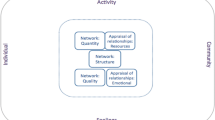Abstract
Stigma impedes the social integration of persons recovering from psychiatric disability, especially those with criminal histories. Little is known about factors that lessen this stigma. Four hundred and four adults listened to one of four vignettes describing a 25-year-old male with schizophrenia and responded to a standard set of items measuring social distance. The individual who was gainfully employed (vs. unemployed), or who had a prior misdemeanor (vs. felony) criminal offense, elicited significantly less stigma. Employment may destigmatize a person coping with both psychiatric disability and a criminal record. Mental health services should encourage paid employment and other paths to community integration.

Similar content being viewed by others
References
Baron, R. C., & Salzer, M. S. (2002). Accounting for unemployment among people with mental illness. Behavioral Sciences & the Law, 20(6), 585–599. doi:10.1002/bsl.513.
Corrigan, P. (2004). How stigma interferes with mental health care. American Psychologist, 59, 614–625. doi:10.1037/0003-066X.59.7.614.
Corrigan, P. W., Edwards, A. B., Green, A., Diwan, S. L., & Penn, D. L. (2001). Prejudice, social distance, and familiarity with mental illness. Schizophrenia Bulletin, 27, 219–225.
Corrigan, P. W., Meuser, K. T., Bond, G. R., Drake, R. E., & Solomon, P. (2008). Principles and practice of psychiatric rehabilitation: An empirical approach. New York: Guilford.
Corrigan, P. W., Watson, A. C., & Barr, L. (2006). The self-stigma of mental illness: Implications for self-esteem and self-efficacy. Journal of Social and Clinical Psychology, 25, 875–884. doi:10.1521/jscp. 2006.25.8.875.
Fisher, W. H., & Drake, R. E. (2007). Forensic mental illness and other policy misadventures. Commentary on “extending assertive community treatment to criminal justice settings: Origins, current evidence, and future directions.” Community Mental Health Journal, 43(5), 545–548. doi:10.1007/s10597-007-9094-7.
Fisher, W. H., Roy-Bujnowski, K. M., Grudzinskas, A. J., Jr., Clayfield, J. C., Banks, S. M., & Wolff, N. (2006). Patterns and prevalence of arrest in a statewide cohort of mental health care consumers. Psychiatric Services (Washington, DC), 57(11), 1623–1638. doi:10.1176/appi.ps.57.11.1623.
Jacobson, N., & Greenley, D. (2001). What is recovery? A conceptual model and explication. Psychiatric Services (Washington, DC), 52, 482–485. doi:10.1176/appi.ps.52.4.482.
Johannesen, J. K., McGrew, J. H., Griss, M. E., & Born, D. (2007). Perception of illness as a barrier to work in consumers of supported employment services. Journal of Vocational Rehabilitation, 27, 39–47.
Kempf, A. M., & Remington, P. L. (2007). New challenges for telephone survey research in the Twenty-First Century. Annual Review of Public Health, 28, 113–126. doi:10.1146/annurev.publhealth.28.021406.144059.
Kommana, S., Mansfield, M., & Penn, D. L. (1997). Dispelling the stigma of schizophrenia. Psychiatric Services (Washington, DC), 48, 1393–1395.
Lamberti, J. S. (2007). Understanding and preventing criminal recidivism among adults with psychotic disorders. Psychiatric Services (Washington, DC), 58(6), 773–781. doi:10.1176/appi.ps.58.6.773.
Link, B. G., & Cullen, F. T. (1990). The labeling theory of mental disorder: A review of the evidence. In J. Greenley (Ed.), Research in community and mental health (Vol. 6, pp. 202–233). Greenwich, CT: JAI Press.
Link, B. G., Cullen, F. T., Frank, J., & Wozniak, J. F. (1987). The social rejection of former mental patients: Understanding why labels matter. American Journal of Sociology, 92, 1461–1500. doi:10.1086/228672.
Link, B. G., Cullen, F. T., Mirotznik, J., & Struening, E. (1992). The consequences of stigma for persons with mental illness: Evidence from the social sciences. In P. J. Fink & A. Tasman (Eds.), Stigma and mental illness (pp. 87–96). Washington, DC: American Psychiatric Press, Inc.
Link, B. G., Phelan, J. C., Bresnahan, M., Stueve, A., & Pescosolido, B. A. (1999). Public conceptions of mental illness: Labels, causes, dangerousness, and social distance. American Journal of Public Health, 89, 1328–1333.
Mann, C. E., & Himelein, M. J. (2004). Factors associated with stigmatization of persons with mental illness. Psychiatric Services (Washington, DC), 55, 185–187. doi:10.1176/appi.ps.55.2.185.
Massachusetts Department of Mental Health. (2006). Fiscal years 2005–2007 state mental health plan. Boston, MA: Author.
Mehta, S., & Farina, A. (1997). Is being “sick” really better? Effect of the disease view of mental disorder on stigma. Journal of Social and Clinical Psychology, 16, 405–419.
Morrisey, J., Meyer, P., & Cuddleback, G. (2007). Extending assertive community treatment to criminal justice settings: Origins, current evidence, and future directions. Community Mental Health Journal, 43(5), 527–544. doi:10.1007/s10597-007-9092-9.
Penn, D. L., & Martin, J. (1998). The stigma of severe mental illness: Some potential solutions for a recalcitrant problem. The Psychiatric Quarterly, 69, 235–247. doi:10.1023/A:1022153327316.
Pettigrew, T. F., & Tropp, L. R. (2000). Does intergroup contact reduce prejudice? Recent meta-analytic findings. In S. Oskamp (Ed.), Reducing prejudice and discrimination (pp. 93–114). Mahwah, NJ: Erlbaum.
Stuart, H. (2006). Mental illness and employment discrimination. Current Opinion in Psychiatry, 19(5), 522–526. doi:10.1097/01.yco.0000238482.27270.5d.
Sturm, R., Gresenz, C. R., Pacula, R. L., & Wells, K. B. (1999). Labor force participation by persons with mental illness. Psychiatric Services (Washington, DC), 50, 1407.
Theriot, M. T., & Segal, S. P. (2005). Involvement with the criminal justice system among new clients at outpatient mental health agencies. Psychiatric Services (Washington, DC), 56, 179–185. doi:10.1176/appi.ps.56.2.179.
Tschopp, M. K., Perkins, D. V., Hart-Katuin, C., Born, D. L., & Holt, S. L. (2007). Employment barriers and strategies for individuals with psychiatric disabilities and criminal histories. Journal of Vocational Rehabilitation, 26, 175–187.
Ware, N., Hopper, K., Tugenberg, T., Dickey, B., & Fisher, D. (2007). Connectedness and citizenship: Redefining social integration. Psychiatric Services, 58, 469–474.
Acknowledgements
Nicole Blaker, Billy Fulton, Lindsey Smith, and Todd Warner served as interviewers for this study. We thank the Department of Sociology Initiative in Health Research and the Center for Middletown Studies at Ball State University for financial support, and Joan E. Lafuze, Ph.D., for advice on the materials used in this project.
Author information
Authors and Affiliations
Corresponding author
Rights and permissions
About this article
Cite this article
Perkins, D.V., Raines, J.A., Tschopp, M.K. et al. Gainful Employment Reduces Stigma Toward People Recovering from Schizophrenia. Community Ment Health J 45, 158–162 (2009). https://doi.org/10.1007/s10597-008-9158-3
Received:
Accepted:
Published:
Issue Date:
DOI: https://doi.org/10.1007/s10597-008-9158-3




